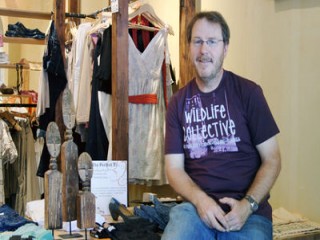
Mike Korchinsky biography
Date of birth : 1961-09-21
Date of death : -
Birthplace : Brookville, Ontario, Canada
Nationality : Canadian
Category : Arts and Entertainment
Last modified : 2011-09-23
Credited as : entrepreneur, fashion designer,
0 votes so far
Korchinsky was born September 21, 1961, in Brookville, Ontario, Canada, to Walter and Gloria Korchinsky. His mother died when he was six and his father, a chemical engineering professor, raised him and his brother on his own. This left the two boys with plenty of time on their hands, so Korchinsky used to read a lot and he liked learning about animals. As a child, he had a collection of elephant figurines. Growing up in Stockport, England, he had dogs and cats as pets, but "never saw anything remotely resembling a wild animal," he said in a telephone interview with Newsmakers.
Following in his father's footsteps, Korchinsky earned a bachelor's degree in chemical engineering from Birmingham University in Birmingham, England. Afterward, he spent a summer working for Shell Oil. "It was so incredibly dull that I decided I didn't want to be a chemical engineer," he told Newsmakers . Anderson Consulting recruited him in 1982 and trained him to be a business consultant. Korchinsky traveled to the United States, Belgium, France, and Spain during this time, and in 1985, he was transferred to the Chicago, Illinois, office.
In 1986, Korchinsky took a job as a consulting manager with Myers Holum in San Francisco, California. In these consulting jobs, he advised businesses to be innovative, but as he told Michael Barrier in Nation's Business, "There was an inherent contradiction, because, internally, they were just as bureaucratic and old-fashioned" as the firms they were trying to help. After two years there, he co-founded Axiom Consulting.
With Axiom Consulting, Korchinsky established a business that incorporated the practices it was recommending for others. For one, he instituted a "productive dress code," which meant employees could dress however they felt most productive. If that meant jeans and short-sleeved shirts, that was fine. He also set up offices in San Francisco's South of Market area that had more natural light and only two or three floors, as opposed to 50 in a high-rise. He felt this would make the workplace more enjoyable for employees. By 1994, Axiom Consulting posted sales of $12 million and boasted a client list that included Wells Fargo, Transamerica, and Shell Oil. In 1995, Korchinsky sold Axiom to Cambridge Technology Partners, but stayed on with the new company as senior vice president.
On a vacation to Africa in 1996, according to Keri Brenner of the Marin Independent Journal article, Korchinsky's entire life began to change. After observing majestic animals lounging in their natural splendor for a few days, "I began seeing skittish animals [and] electric fences," he told Brenner. "I began to ask questions." He found out animals were being hunted by poor locals who poached them to eat their meat and sell their hides; trees were being destroyed for fuel. Angry, Korchinsky resolved to do something about it. Instead of trying to force change on Africans, he founded a model of "consumer-powered conservation," wrote Nichole L. Torres in Entrepreneur. He envisioned a business that would provide an economic engine for the area to help the people and at the same time preserve the local environment. "Many people, after they've made their money," Korchinsky stated to Brenner, "give their money and hearts to conservation, but very few give their business acumen."
In 1997 Korchinsky put his model into practice with Wildlife Works. He decided on a clothing company, according to a reporter for Planetsave.com , for these reasons: "Fashion is trendy enough to get celebrity and media attention. It can be made with environmentally friendly materials. It has a high-labor content but a low-skill level." Creative director Tammy Hulva comes up with themes for each seasonal collection. Some of the clothes, which are made of organically grown cotton, feature endangered species like silverback gorillas and Bengal tigers, while others have slogans like "Tree Hugger." T-shirts sell for about $28 and up.
The company got started with help from private investors and in 1999, Wildlife Works bought a failing cattle ranch in Tsavo National Park in Kenya to convert into a garment factory and wildlife sanctuary. The 80,000-acre Rukinga Wildlife Sanctuary is home to 47 mammal species and several endangered species. As of late 2003, the factory in Kenya employed 56 locals who earn $50 a week with health benefits (the average annual salary in Kenya is $300 a year). Korchinsky gives back 20 percent of the company's proceeds to fund community projects like schools and libraries in addition to the sanctuary, and hopes to increase that amount to 25 percent, according to Brenner. Estimated sales for 2003 were $2 million.
Korchinsky is married to Linda Hanson, who owns an insurance firm, and they have two dogs, Joey and Tess, and one cat, Ben. A self-confessed "nature channel addict," as he said in the telephone interview with Newsmakers, he is also a vegetarian. Korchinsky plans to continue to grow his business in order to expand conservation efforts to more places in the world such as India and South America, he noted in the telephone interview.
















